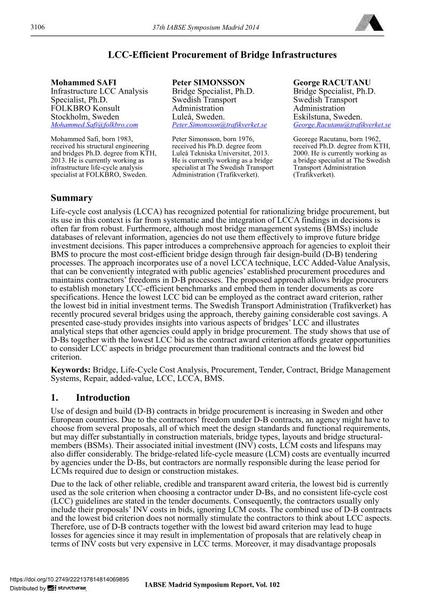LCC-Efficient Procurement of Bridge Infrastructures

|
|
|||||||||||
Bibliografische Angaben
| Autor(en): |
Mohammed Safi
Peter Simonsson George Racutanu |
||||
|---|---|---|---|---|---|
| Medium: | Tagungsbeitrag | ||||
| Sprache(n): | Englisch | ||||
| Tagung: | IABSE Symposium: Engineering for Progress, Nature and People, Madrid, Spain, 3-5 September 2014 | ||||
| Veröffentlicht in: | IABSE Symposium Madrid 2014 | ||||
|
|||||
| Seite(n): | 3106-3112 | ||||
| Anzahl der Seiten (im PDF): | 7 | ||||
| Jahr: | 2014 | ||||
| DOI: | 10.2749/222137814814069895 | ||||
| Abstrakt: |
Life-cycle cost analysis (LCCA) has recognized potential for rationalizing bridge procurement, but its use in this context is far from systematic and the integration of LCCA findings in decisions is often far from robust. Furthermore, although most bridge management systems (BMSs) include databases of relevant information, agencies do not use them effectively to improve future bridge investment decisions. This paper introduces a comprehensive approach for agencies to exploit their BMS to procure the most cost-efficient bridge design through fair design-build (D-B) tendering processes. The approach incorporates use of a novel LCCA technique, LCC Added-Value Analysis, that can be conveniently integrated with public agencies’ established procurement procedures and maintains contractors’ freedoms in D-B processes. The proposed approach allows bridge procurers to establish monetary LCC-efficient benchmarks and embed them in tender documents as core specifications. Hence the lowest LCC bid can be employed as the contract award criterion, rather the lowest bid in initial investment terms. The Swedish Transport Administration (Trafikverket) has recently procured several bridges using the approach, thereby gaining considerable cost savings. A presented case-study provides insights into various aspects of bridges’ LCC and illustrates analytical steps that other agencies could apply in bridge procurement. The study shows that use of D-Bs together with the lowest LCC bid as the contract award criterion affords greater opportunities to consider LCC aspects in bridge procurement than traditional contracts and the lowest bid criterion. |
||||
| Stichwörter: |
Brücke Reparatur
|
||||
